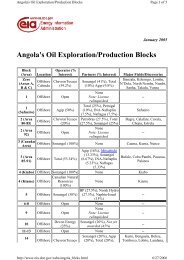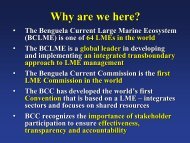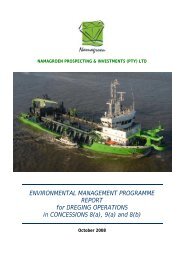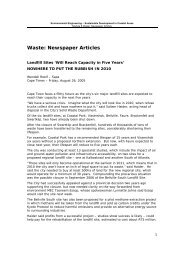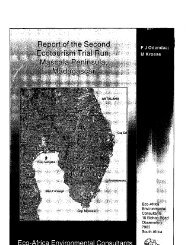Full report LR.pdf - DLIST Benguela
Full report LR.pdf - DLIST Benguela
Full report LR.pdf - DLIST Benguela
- No tags were found...
You also want an ePaper? Increase the reach of your titles
YUMPU automatically turns print PDFs into web optimized ePapers that Google loves.
NACOMA Project – Preparation PhaseAnalysis of the Institutional Capacity in the Namib Coast Regional Councilsprogress with the establishment of structures to effect decentralisation and an awarenessas well as challenges on the part of both regional and local authorities. It may be useful tobriefly examine the viewpoints of key stakeholders in Regional Councils and various lineministries.o Shared vision – The decentralisation process was subjected to considerableconsensus-building to solicit support from the relevant stakeholders (including primebeneficiaries) during the preparation phase. These activities ensured a commonunderstanding of the (rationale behind the) decentralisation process – particularlywithin the coastal Regional Councils.o Enabling environment – The sound legal framework provided the platform on whichthe required enabling environment had to be cultivated and developed. However,there are strong perceptions (within regional and local and even central governmentlevels) that the process is impeded by ‘deliberate restricted transparency, opennessand unwillingness to share authority and resources’ – obviously damaging thoseingredients that are required to create and enhance the required conduciveenvironment. A major reason for that perception emanates from the poor, and ratheruneven, flow of information from central government to the regions. A proposeddecentralisation newsletter was never put into effect. The ministries’ apparentresistance to change emanates, to a large extent, from widespread anxiety caused bylimited information and proactive support from the top administrative and politicallevels. Decentralisation has after all never been an easy and smooth process anywherein the world as it requires authority to be released from certain centres to be lodgednearer to ground level. There are, however, clear and positive signs that attitudestowards the decentralisation process are changing in a positive way.o Dependency – A fundamental impetus for the decentralisation process is the need toreduce dependence of regional and local government on the national fiscus. However,the dependency-syndrome has remained largely unchanged – it is the view of somethat these authorities are becoming increasingly reliant on central government forfunding. Due to capacity constraints, all finances are controlled by the MRLGH -based on the agency arrangements. This finance function is likely to be one of the lastfunctions that will be transferred. Since Permanent Secretaries remain the accountingofficers during delegation, and since a grant-transfer-system still has to be developed,the financial control will remain at the centre for the time being. Under devolution,once the grant system is in place, the financial management responsibility will bevested in Regional Councils.The Act’s prohibition of the generation of any additional funding – besides the 5%rate income from local authorities – is also believed to aggravate the financialpredicament of the Regional Councils. Various options are explored by the MRLGHon how to improve this situation. For example, Regional Councils’ own potentialrevenues will be explored as an element of the FINNIDA programme, just as revenuecollection systems will be developed.12



